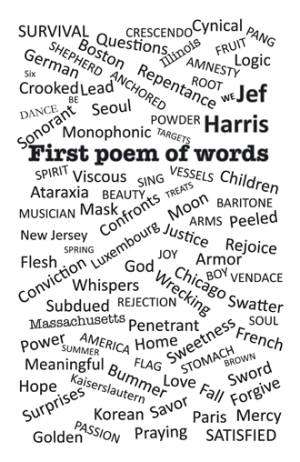First Poem of Words
Various themes, including music, war, love, and faith, make up this dense array of passionate and volatile poems.
In his collection First Poem of Words, Jef Harris dives into various modes of poetic license and expression. The poems are sectioned off into what he terms “TriWords,” which are used, as Harris writes in the author’s note, for their “linguistic allure” as opposed to their “conventional denotations.” This makes for a particularly interesting freedom in the way these poems can be read; the TriWords function as a kind of mantra for what is to follow. Like the poems themselves, the TriWords demand the reader to become engaged in the linguistic inventiveness that Harris employs throughout the collection.
Following the TriWord “Rejoice/Conviction/Asymmetric,” the poem “Peeling” uses the metaphorical subject of an orange to supply the speaker with a kind of emotional skin. “I’m being peeled like an orange” leads into the quiet conviction of the poem’s only one-line stanza: “A soft voice whispers, ‘Go through it.’” The emotions that follow are full of rejoicing, closing in on a layer of confession clothed in the subtle shift of the prepositions that differentiate the last two lines: “This is a new thing being done to me. / This is a good thing being done in me.” While these variations are sometimes overextended and pursued down the page without the aid of image, a poem like “Peeling” incorporates a soft, surely humble tone that captures the kind of calm and collected vernacular this poetry seems to yearn for.
While there is an emphasis on a sometimes heightened and forced rhyme that dilutes certain poems to an almost purely linguistic element—“definition devoid of distinction / belittles the season for serious reasons”—the haiku and love poems that dot this collection provide a subtle minimalistic pause amid such lyric intensity. The poem “Tennis” is a fine example of the haiku form. The poem reads, “In Seoul, old warrior’s / Backhand lobs soft bouncing balls / Amid patriarchs.” The setting of Seoul precedes the image of the warrior, setting up the final line with the subtle dark overtone that often runs underneath this poetry.
Photographs are often set alongside the poems in this collection, many of them credited to the author himself. This gives an interesting visceral, almost photojournalistic quality to certain poems, especially those that deal with undertones of war. “The Holes in the Rain” is a poem that is on full display in both its photographic quality and its theme of the wartime experience. The first photo above the poem displays a tiled floor dotted by raindrops. It’s a surreal image that symbolizes a certain kind of calm sadness emphasized by the poem’s repetition of the word “ataraxia,” which is a noun for a state of serene calmness. This is juxtaposed to images that are beautifully written and of a shocking quality: “I had opium for pain but nothing for the shock / Of seeing the smoking body of a fried man.”
As Harris notes in the epilogue, these are poems that—while sometimes lyrically dense and various in their themes—deserve more than one read for their voices to be unraveled.
Reviewed by
Kenny Jakubas
Disclosure: This article is not an endorsement, but a review. The publisher of this book provided free copies of the book and paid a small fee to have their book reviewed by a professional reviewer. Foreword Reviews and Clarion Reviews make no guarantee that the publisher will receive a positive review. Foreword Magazine, Inc. is disclosing this in accordance with the Federal Trade Commission’s 16 CFR, Part 255.

